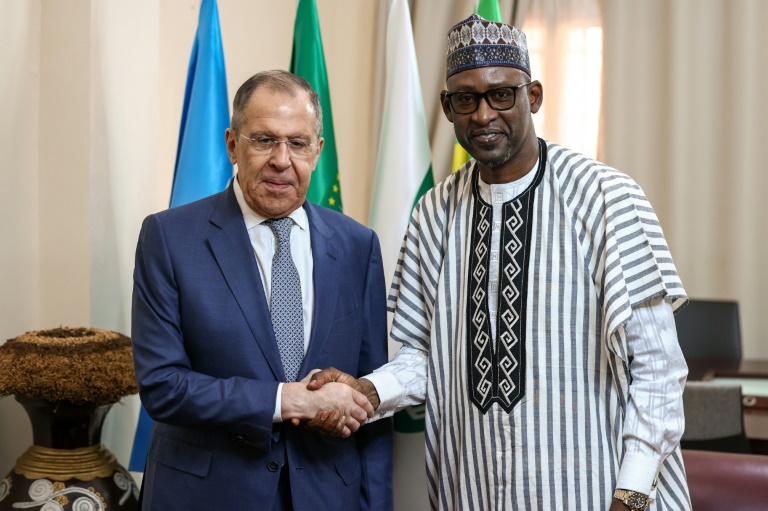Mali calls for immediate end of UN mission

Mali’s Foreign Minister Abdoulaye Diop — seen here with visiting Russian Foreign Minister Sergei Lavrov in February 2023 — has called for an end to the UN peacekeeping mission in his country
United Nations – Mali’s foreign minister called Friday for the UN Security Council to withdraw the peacekeeping mission in his country “without delay,” denouncing its “failure” to respond to security challenges.
The country’s military rulers have increasingly imposed operational restrictions on peacekeepers and also broke Mali’s longstanding alliance with former colonial power France.
“The government of Mali calls for the withdrawal without delay of Minusma,” the name of the United Nations force in Mali, said Foreign Minister Abdoulaye Diop.
“However, the government is willing to cooperate with the United Nations on this issue,” Diop said, rejecting all options for changing the mandate of the mission as proposed by the UN secretary-general.
“Minusma seems to have become part of the problem by fueling community tensions exacerbated by extremely serious allegations which are highly detrimental to peace, reconciliation and national cohesion in Mali,” said the minister.
“This situation generates a feeling of distrust among the populations with regard to Minusma,” he added, noting a recent damning report by the UN High Commissioner for Human Rights on an anti-jihadist operation in Moura in March 2022.
– Divisions –
UN chief Antonio Guterres in January put forward three options for amending the mission, from an increase in personnel to a withdrawal of troops.
In a report published at the beginning of the week, he recommended to the Council an intermediate solution, to “reconfigure” the mission to concentrate on a limited number of priorities.
After the Security Council meeting, Minusma’s head told reporters that conducting UN peacekeeping operations was “nearly impossible” without the consent of the host country.
“It’s a decision that the council has to make,” said El Ghassim Wane.
“But the point I’m making, and I believe it’s a point that everyone agrees on, is that peacekeeping is based on the principle of consent from the host country and absent that consent, of course operations are nearly impossible,” he added.
Friday’s meeting underscored the divisions within the Security Council on how to go forward with the UN peacekeeping mission in Mali, established in 2013 to help stabilize a state threatened with collapse under the burgeoning threat from jihadist groups.
Several countries, including France, which is in charge of drafting resolutions on Mali, the United States and Britain, have underlined the importance of Minusma, which French ambassador Nicolas de Riviere called “an important issue for Mali but also for the stability of the whole region.”
On the other hand, Russian ambassador Vassili Nebenzia said that “any proposals here should be based on the opinion of the host country.”
“The real issue is not the number of peacekeepers but their functions,” he said, adding that one of the key tasks for the government of Mali was “fighting terrorism, which is not provided for in the mandate of the Blue Helmets.”
The landlocked Sahel state has been battling a security crisis since jihadist and separatist insurgencies broke out in the north in 2012.
It has since August 2020 been ruled by a military junta, which broke a long-standing alliance with France and other Western partners in the fight against jihadism and turned to Russia for political and military assistance.
